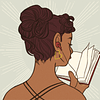Take a photo of a barcode or cover
It's one of those books/critics you read and can't help but apply it to every media you consume. Necessary reading in this era of media illiteracy.
I read this for my Multicultural Literature for Children course.There is no denying that Morrison is one of the great writers of our time, but I just found this book to be overly dense for me. I probably would have liked it if I had read more than one of the books she mentions beforehand, but not having read most of them, I just felt completely lost.
Probably a 4.5 I'll reprocess through a reread later, but what a smart woman, someone give her a Nobel Prize for her services to literature.
I was far from fully appreciating this, partially because I'm ignorant of many of the works Morrison cited. I'm looking forward to revisiting "Black Matters" when I get to it in The Source of Self-Regard.
I really wanted to love this book, and I was excited to read it, but ultimately I found it to be not so great. I think Morrison's thesis is a good one, and ideally a discussion of what she calls "Africanism" (a term I dislike, even though I see it's her version of Orientalism, because Orientalism works because the original term isn't really used anymore) would be great followup for students who have read excerpts of Said's work, because it does bring it closer to home, at least for Americans. That said, I didn't really feel like this was a book like Orientalism at all; instead of explaining her idea fully, she went straight into close reading, and you can't prove anything by close reading if you haven't explained what it is you're proving. The final third of the book came closest to that, and its study of Hemingway was near to what I think she was getting at, but all together I think this book missed its mark by trying to take on too much content with too much brevity.
There's a lot of great observations in here, especially if you're a connoisseur or student of American literature. For me, the most illuminating, and shockingly shocking observation was the simple recognition that we don't talk about the meaning of race in American Literature classes. I have an MA in literature, focusing on American Lit, and I don't remember a real discussion of race ever. Not with Faulkner, not with Twain, not with Morrison herself (maybe the compulsion to avoid talk of race is why we never read The Bluest Eye in school, but did read Beloved, where talk of race could be substituted with talk of slavery?). And I went to pretty good schools and had pretty good Professors. It did seem, as she said, impolite to broach the topic. I remember feeling the need to get some guidance, clarity on the different kinds and degrees of racism in these American classics at the very least, but no dice.
But that nod to academic failings is just the jumping off point for Toni Morrison's brief, dense analysis if the role of blackness in American lit.
Very academic. Not in terms of bibliographic references, but definitely in the lexicon and some assumptions about our understanding of how literature works.
But that nod to academic failings is just the jumping off point for Toni Morrison's brief, dense analysis if the role of blackness in American lit.
Very academic. Not in terms of bibliographic references, but definitely in the lexicon and some assumptions about our understanding of how literature works.
I honestly don’t feel like I can accurately rate this book. I read it for school and feel like it was over my head, and the professor didn’t offer any lectures to aid in understanding. I’m sure it’s a great book with some amazing ideas about literature, but I just didn’t understand any of it.
informative
reflective
fast-paced
an insightful and immeasurably eye-opening piece on white depictions of blackness in american literature, narrated by the author's rich, beautiful voice. though at times the abstract concepts morrison referred to escaped me, reading this after finishing moby dick was incredibly valuable.
challenging
informative
reflective







